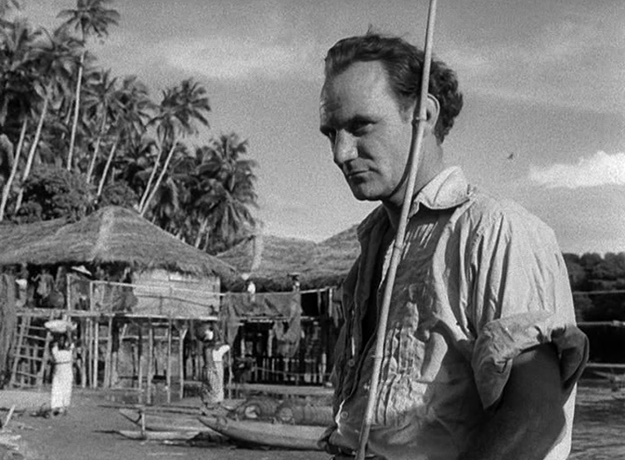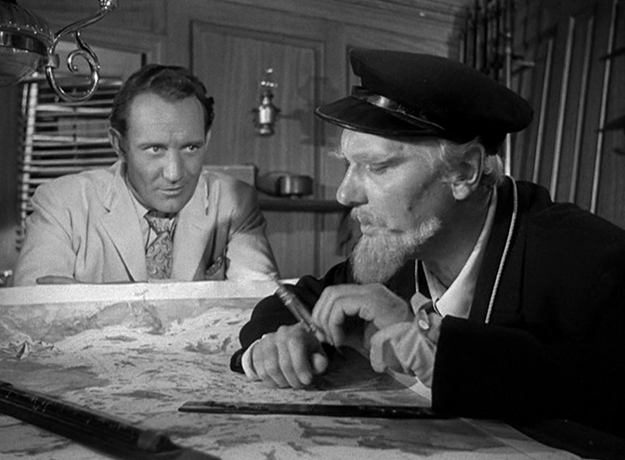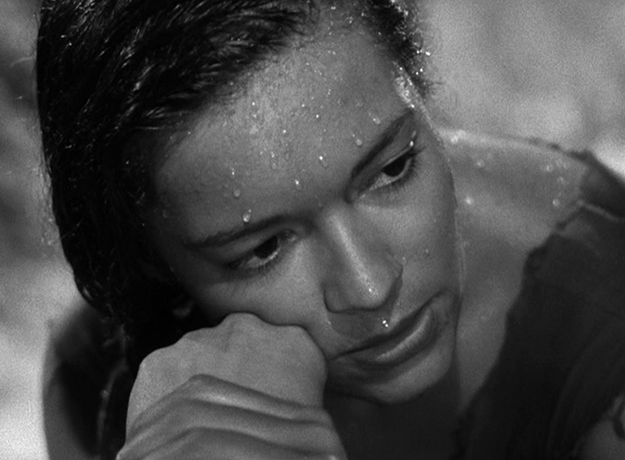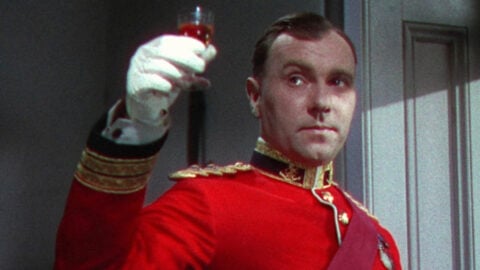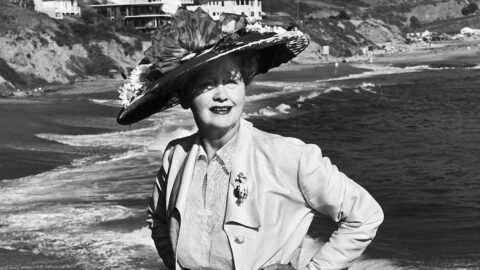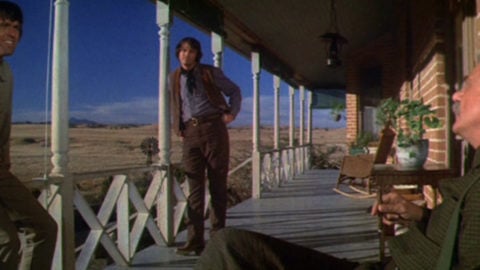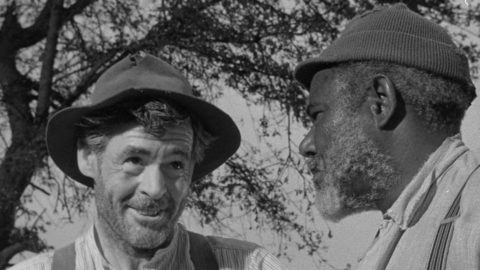TCM Diary: Outcast of the Islands
Outcast of the Islands is a film quite like its antihero: disillusioned from the first frame, impervious to compromise, and for many, too despairing to endure. It was made by Carol Reed in 1951 after a hat trick of postwar masterpieces: the breathless chronicle of an IRA gunman’s last hours, Odd Man Out; the child’s-eye study of good intentions gone astray, The Fallen Idol; and that cockeyed rumination on ideals leveled by bombs, The Third Man. But where all of those films, even The Third Man, find small recesses for hope, hero-worship, and belief in causes greater than oneself, Outcast—as its title implies—stalks the periphery in solipsistic seclusion.
Adapted from Joseph Conrad’s second novel, An Outcast of the Islands, it borrows a number of characters from his first, Almayer’s Folly—principally ship’s captain Tom Lingard and his son-in-law Almayer, cohorts in a prosperous East Asian trade company. Ralph Richardson receives top billing as the paternalistic Lingard (and the film will air as part of TCM’s all-day salute to Richardson on August 13), but the focus is undeniably on Peter Willems, a man without a scruple to his name, played magnificently against type by The Third Man’s moral custodian, Trevor Howard.
Despised by all including his wife, Willems is sacked from his position as shipping port manager in Singapore and run out of town. His only ally is Captain Lingard, who rescued him when he was a boy of 12 and taught him the mercantile trade. Lingard offers him sanctuary on his ship and shows him the perilous navigation route known only to his crew. Believing his protégé will make a fresh start, Lingard deposits him at an outpost in Borneo run by his daughter (Wendy Hiller) and her husband Almayer (Robert Morley), a venal and vindictive functionary.
Willems and Almayer are avaricious birds of a feather; each would have an easier time proving his worth to Lingard without the other’s conflicting agenda. In the Captain’s absence, Willems falls heedlessly for native girl Aissa (Algerian actress Kerima, in a wordless turn) and is exploited by village elders seeking to expand their trade options. Rewarding Lingard’s trust with betrayal, he conducts himself with the egocentric abandon—and without even the self-rationalizing savoir faire—of The Third Man’s Harry Lime.
If Outcast is held in lower esteem than that film, Reed’s unchallenged magnum opus, it’s likely because it concerns itself less with translating its bankrupt world into cinematic technique. Gone are the visual hallmarks of The Third Man—the canted angles, the discomfitingly cheerful zither score, the symbols of domestic harmony (kittens, balloons) made fecund with menace, and the seductive moral relativism suffusing every shot. Here Reed relies on his topflight cast, William Fairchild’s caustic script, and atmospheric locales to realize Conrad’s tableau of putrid humanity left to rot in the sun. But if its appeal as entertainment is more specialized than its predecessor, that could be credited to its total commitment to Conrad’s worldview. “A picture should end as it has to,” the director opined. “I don’t think anything in life ends ‘right’”—a conviction that clashed with (and fortunately overturned) author Graham Greene’s notion of how The Third Man should culminate.
The invaluable archive Britmovie declares Outcast “one of the most powerful evocations of human degradation ever to reach an audience through a commercial medium like film,” and rightly claims that “the story is almost never vitiated or debased by commercialism.” In the end it is Reed’s harshest and bleakest work; Howard’s fate is worse than the principled death of James Mason’s radical in Odd Man Out or the heartbreak of Joseph Cotten’s spurned writer in The Third Man. He’s condemned to live in obscurity and disgrace, all his schemes come to naught, his lone friend and protector—the Prospero to his Caliban—branding him “my mistake…my shame!”
As protagonists go, Willems is uniquely unsympathetic. In what could almost qualify as an experiment in alienation, Reed never permits the viewer to extend him a morsel of pity. He’s a typically entitled colonialist in a fuming clime, a floral band around his Panama hat and a white suit belying his black heart. Producer Alexander Korda wanted Stewart Granger for the role, but Reed—a frequent Howard collaborator since the actor’s debut, The Way Ahead—said with great affection that no one was better suited to play a moral degenerate. Howard, best known as cinema’s most refined prospective adulterer in David Lean’s timeless Brief Encounter and as Major Calloway, the image of rectitude and clipped efficiency in The Third Man, seems emancipated by the chance to play a debauched wastrel. Quick with advice he’s unwilling to heed (“Always stay ahead of the next fellow…trust no one”) and compliments that reveal his true nature (“What a perfect relationship ours is,” he tells Aissa, their language barrier enabling him to confide his innermost flaws), Willems would become monotonous were it not for Howard’s precise and fascinating delineation of his inexorable decline.
From the obsequious, fez-wearing Arab trader reminiscent of Sydney Greenstreet’s black marketeer in Casablanca to the native tribesmen using Aissa as bait, Outcast teems with foulness and duplicity. Even Lingard, ostensibly benevolent, is a Kurtz-like figure, ascribing the indigenous people’s dubious morale to his firm guidance and monopolistic authority. Almayer is a study in ambition without vision—mediocre in all things, concerned only with pleasing his boss and fending off threats to his territory. For those acquainted with Morley’s stock-in-trade fops (notably Katharine Hepburn’s missionary brother in The African Queen), Almayer will seem at first another in a gallery of boorish, ersatz gentlemen. But his true nature emerges when he grows cognizant of the challenge Willems poses to his dominion; clutching his daughter to his chest (played by the actor’s real offspring, Annabel), exhorting her to “call pig” at the encroacher, Morley uses his gelatinous features and uncommon lung power to startling effect. He is both laughably childlike and alarmingly desperate, as though at any moment he might dissolve in his own bitterness and bile.
In Edward Scaife and John Wilcox’s location shooting, the geography, customs, and music of Ceylan (now Sri Lanka)—where Howard lived as a child—are as palpable as those of Vienna in The Third Man. The reduced censorship of ‘50s British cinema is constantly in evidence, above all in the passion between Willems and Aissa that feels charged even now. And the portrait of a wicked man’s expulsion from a depraved world is the most audacious rendering of squalor from Reed, a director known for a chase through the sewer of a decimated city. Early in the film, Lingard reassures his charge that “you’re young yet, and life is long”; he intones at the fade-out that “life is foul.” Look for no further moral here.
Outcast of the Islands airs August 13 on Turner Classic Movies.
Steven Mears received his MA in film from Columbia University, where he wrote a thesis on depictions of old age in American cinema.



